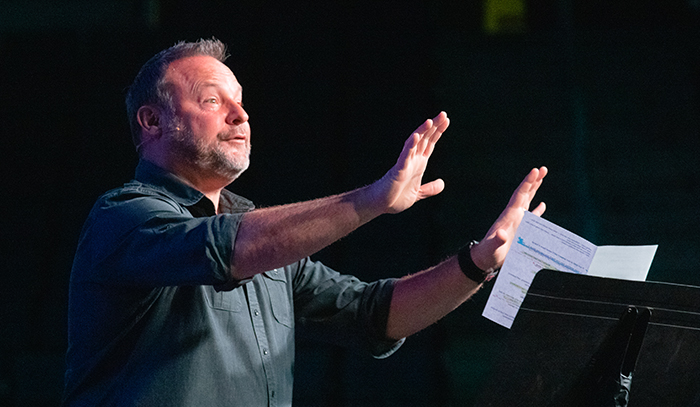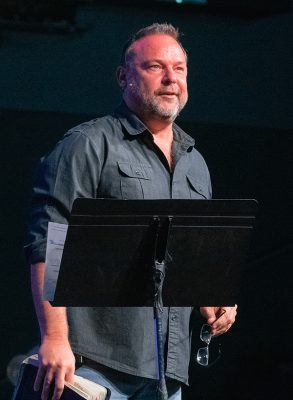
Story by Rick Vacek
Photos by Matt Nykamp
GCU News Bureau
Chris Brown doesn’t waste time.
The Senior Pastor of North Coast Church in Vista, California, doesn’t just walk onto the stage, he charges. He seemingly launches into his talk before he stops moving – and then never stops moving, waving his arms to make point after interesting point and turning asides into front-and-center thoughts.

He was at it again Monday morning in Chapel at Grand Canyon University. It was new to the students in attendance – he hadn’t spoken at GCU in nearly 4½ years – but wonderfully familiar to anyone who had seen him in action before.
Brown brings biblical stories to life, and he told the tale of the Samaritan woman talking to Jesus at the well in ways that practically made you feel the water splashing from her bucket. His larger message: We never will fully leave behind our sins, but rather than just seek forgiveness for them, we should seek freedom from them.
Those unfamiliar with his style might have freely wondered what he was going to talk about when he began with these words: “She has paused just inside the small wooden door to check her reflection one more time.”
Without revealing for several minutes that he was talking about the Samaritan woman, he described in great deal what she must have been feeling as she ventured out, hoping to avoid scrutiny for the failings that haunted her daily.
A sampling of his descriptions, which could apply to so many people in today’s world:
- As she puts a scarf on her head and pulls it over her nose: “If you ask her or the very few friends that she has, she will say it’s all about accessorizing. But those that know her better know it’s all about hiding.”
- She winks at her reflection: “A close friend had told her years ago she needed to work on her self-worth. ‘Before you leave the house, you should wink at yourself and tell you that you’re lovable.’ She’s long since given up the phrase that she’s lovable. The wink still remains more a habit than anything.”
- After she gets outside the city, away from the crowd: “She will breathe deeply for the first time. It’s out here – cacti, shrubs, dried brush … don’t recognize. They have no memory. They don’t whisper those words.”
Brown insists that he’s not much of a reader, but these ancient stories fascinate him. He can’t get enough of them for a simple reason:

“If you want to know who your God is and how He deals with you today, you better go back and see how He dealt with people then. He hasn’t changed. He hasn’t gotten smarter. He doesn’t have more degrees. He hasn’t figured out people better. He is the same. He is God.
“So the way He deals with her is the way He deals with you. And maybe, just maybe, today, against your wishes, you have to face your greatest nightmare.”
Having her sins recounted was the Samaritan woman’s nightmare, but Brown points out that Jesus knew she would be at the well, knew her story (five husbands and now living with a man who was not her husband) and knew it was His destiny to set her straight.
So when the apostles left Him behind to go into the town for food, her nightmare became her dream of finding the “living water” about which He spoke. But maybe, Brown suggested, the woman wasn’t of ill repute. Maybe she was a victim, as many women – especially Samaritan women – were in ancient times and still are today. In other words, maybe we shouldn’t judge so quickly.
“The fact that she’s had five husbands might not have been her choice, but just the way she has been abandoned, discarded, rejected, abused and let go …” he said. “I don’t know if this is because of the woman having more – What would we say? Loose morals? – or if this is a woman who has been caught up in the evil of someone else’s hands over and over and over again.”
This is where Brown turned the story into a message that applied to everyone in the Arena. He asked for a show of hands: How many people there had ever asked God for forgiveness? Seemingly every hand shot up. His next question was more telling: How many had sought God's forgiveness for the exact same action or event more than once?
He reminded them of what 1 John 1:9 says:
If we confess our sins, He is faithful and just and will forgive us our sins and cleanse us from all unrighteousness.
The church, Brown declared, does an amazing job of teaching forgiveness but a lousy job of teaching the “and” – freedom.
“Not dealing with our past is going to rob us of our future,” he said. “Have you ever noticed that you can’t outrun your past? Have you ever noticed no matter how far away you get ... you will always be there?”

Brown put it another way: Is there something in your life that is so shameful, he asked listeners, you would feel compelled to hide like the Samaritan woman if anyone found out?
“If there’s something that has a hold on you,” he said, “you don’t have freedom from it.”
And if you don’t have freedom from it, “you’re going to walk away from this well and go back to … what? You.”
Facing the truth and accepting it aren’t the same thing, he added: “We usually don’t accept our past. We try to bury it.”
It started in Genesis, he said, with Adam and Eve. Adam blamed Eve for eating the fruit. She blamed the snake.
Brown also explained the difference between guilt and shame:
“Guilt is, ‘I feel bad for what I’ve done.’ Shame is, ‘I am bad because of what’s done.’ Guilt is, ‘I’ve broken something.’ Shame is, ‘Now I am broken.’”
Brown was really revved up at this point. Unless you find freedom, he declared, your spirituality will last for only a few hundred yards outside this worship service.
“We have these amazing worship movements in this generation, but then you have to go back to you,” he said, his voice rising and arms waving more with each sentence. “And Jesus says, ‘Stop. If you’re going to worship Me, you have to worship spiritually and with the truth about you, for God is truth.
“And real worshippers must worship God spiritually and in truth. Otherwise, you’re going to live for great 'well' moments that can’t go back to town. You’re going to live for great God moments that don’t change you when you’re alone. And when you’re alone by yourself, you hate who you’re with.”
Brown talked openly about his own failings many years ago, about how “there’s a higher truth of how God sees me in spite of that,” about how he doesn’t let the devil dispute his worthiness for speaking to college students about the Bible. How he deals with his failings are a lesson for all.
“No matter how many decades go by, I’ll never get over ’89, ’90, ’91, ’92 and most of ’93,” he said. “And your past will be Satan’s greatest weapon against you. Or it can become God’s most powerful tool for you.”
There were more memorable quotes:
“Failure in the kingdom of God is always an event. It is never a person.”
And then this:
“The next time you go to raise your hands and that little voice goes, ‘You? Remember who you are?’ You’re going to stop and go, ‘I do. And that’s why I raise them higher.’”
Just as suddenly as he began his talk, he charged into a prayer for GCU’s students and then charged right off the stage when he was done as the audience did something that doesn't happen often at the end of a Chapel talk -- it applauded.
Even though the students were seeing him in action for the first time, they knew one thing for sure: It was time well spent.
● Chapel replay
● Next Monday’s speaker: GCU alumnus Nick Ely, Christ Church
Contact Rick Vacek at (602) 639-8203 or [email protected].
****
Related content:
GCU Today: Chapel to feature reunions with speakers from past
GCU Today: Mackey links humility, prayer with story of Uzziah
GCU Today: Griffin centers Chapel talk on shifting margins
GCU Today: Chapel: Don't pass up lessons from life's offenses
GCU Today: Moore sets a high bar for Musical Worship Chapel
GCU Today: Demeter shows Chapel how faith can save you



































































